Overview
This document provides a detailed description of the Pathfinder tool.
Pathfinder is a knowledge management system, part of the Omilia Cloud Platform® (OCP®), which allows users to upload raw data, use that raw data to create intents based on it, and create the knowledge base from these intents. The knowledge base can then be used in your Intent OCP miniApps® when setting up Announcements, particularly for the Knowledge Base Announcements and the Knowledge Base Fallback.
Supported data formats include PDF, TXT, CSV, and HTML. It is also possible to add a URL to the Pathfinder to get information from it.
You can access Pathfinder in the side panel as shown below.
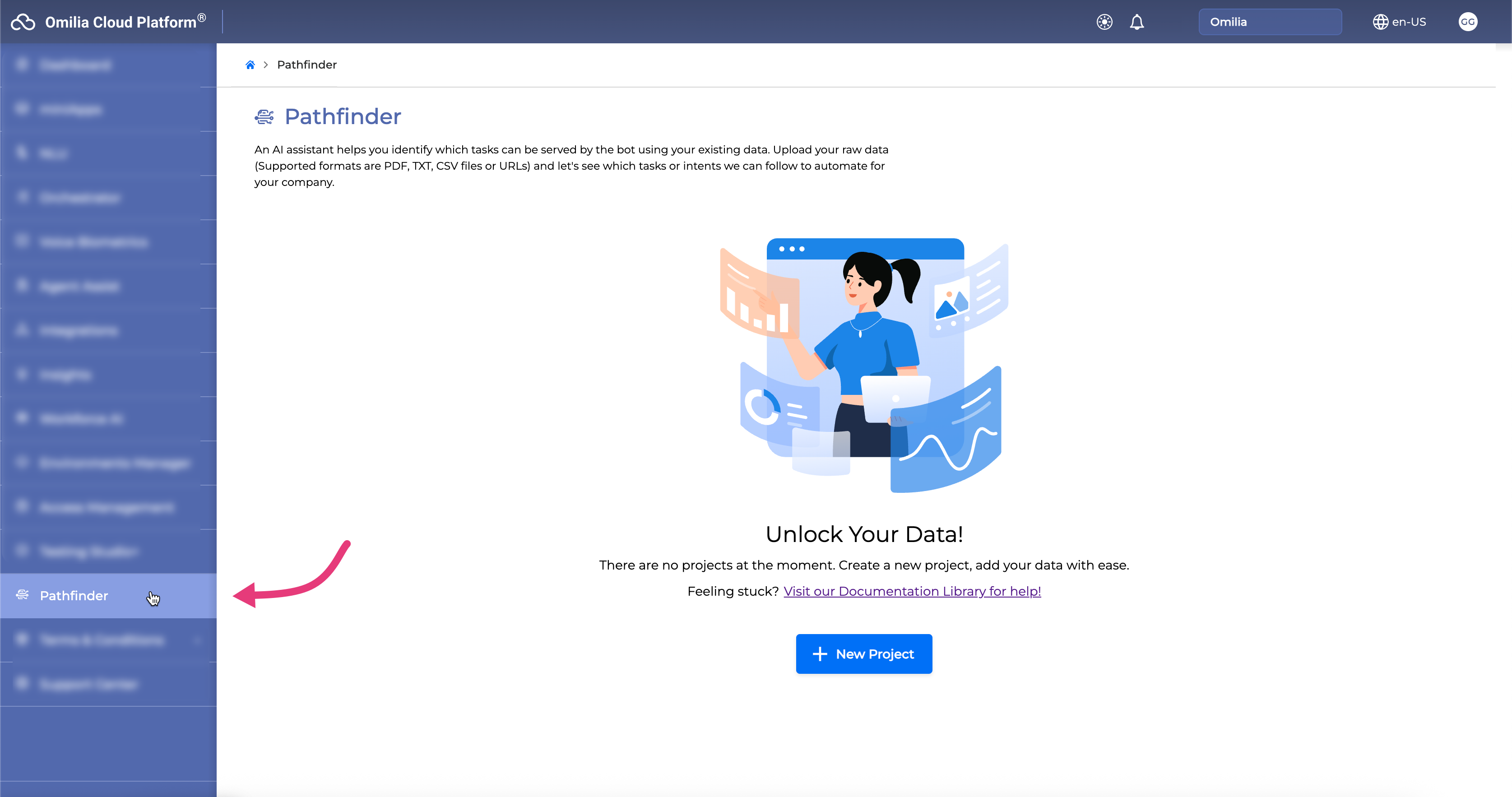
Create a Project
To add data for work, you need to create a project first. Click the + New Project button to get started.
All your created projects will be listed in the Pathfinder tab.
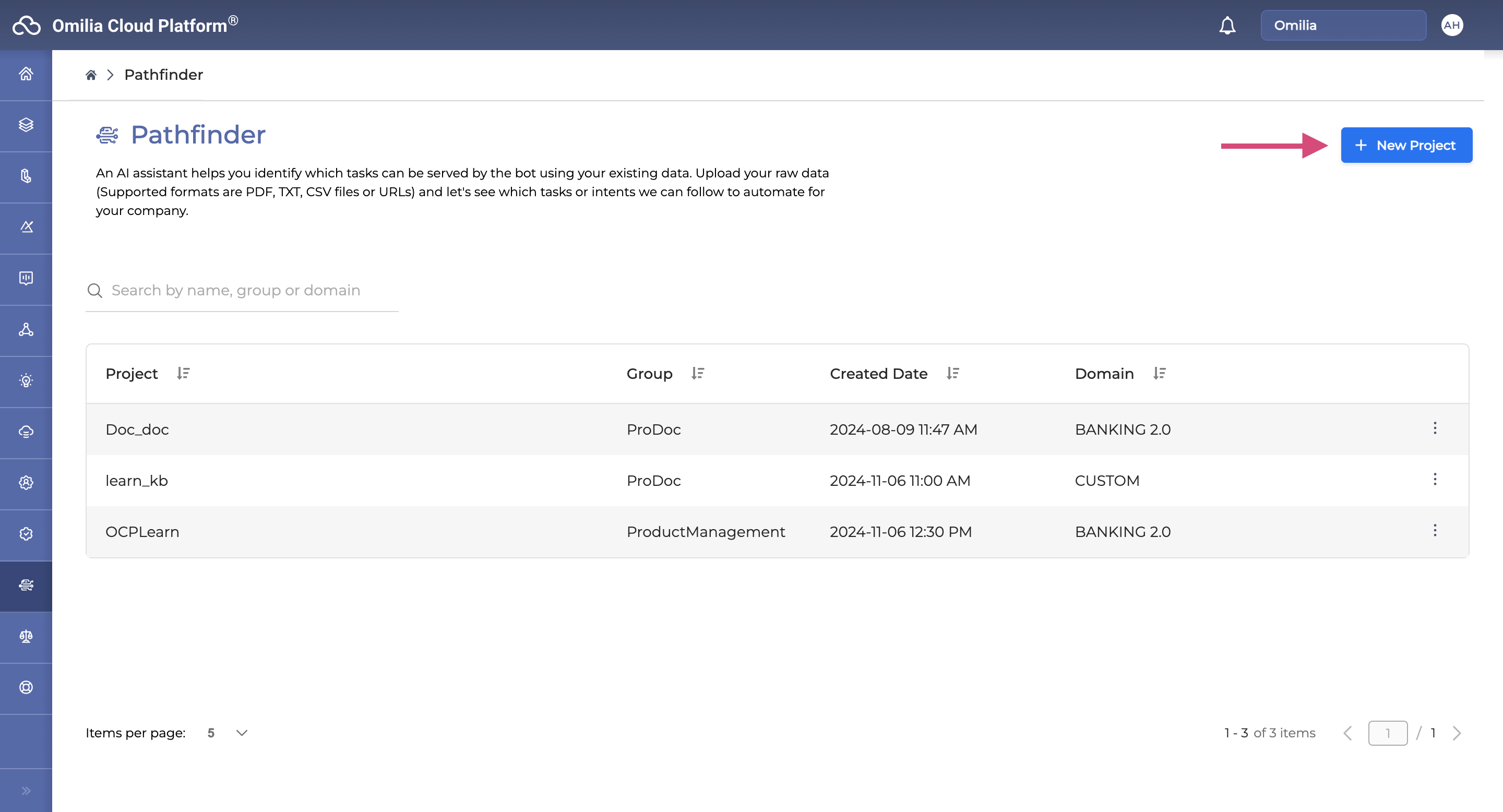
Once you click the + New Project button, you’ll see a modal prompting you to create the Name for the project, select the Group it belongs to, choose a Domain from the dropdown options, select the Language of the data you want to process, and select a project type (Generative AI or Pre-defined; see more about project types in Retrieval-Augmented Generation).
For the project Name, only letters, numbers, and underscores are allowed.
You can create a project only if you are assigned to a group. If you are not assigned to any group, please contact your manager or IT support.
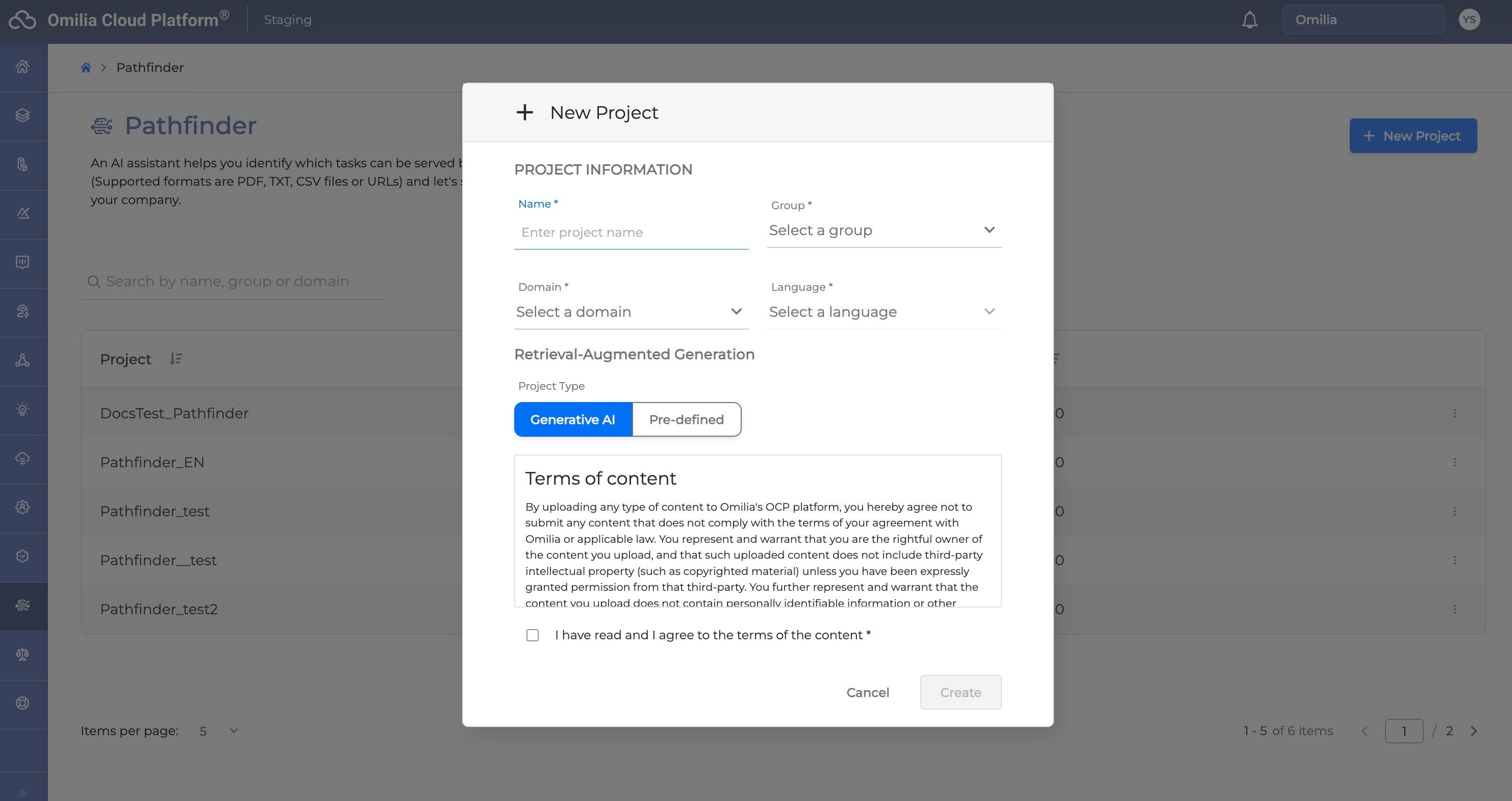
When selecting a Domain, the list of available languages in the Language field will vary based on the chosen option. The table below outlines the supported languages for each domain.
|
Domain |
German (DE) |
Greek (GR) |
English (US) |
English (GB) |
Spanish (ES) |
French (CA) |
Portuguese (PT) |
|
Banking 2.0 |
✓ |
✓ |
✓ |
|
✓ |
✓ |
|
|
Car Retail |
|
|
✓ |
|
|
|
|
|
Energy |
|
✓ |
✓ |
|
✓ |
|
|
|
Telecommunications |
|
✓ |
|
|
|
|
|
|
Universal |
✓ |
✓ |
✓ |
✓ |
✓ |
✓ |
✓ |
|
Universal 2.0 |
|
|
✓ |
|
|
|
|
|
Custom |
✓ |
✓ |
✓ |
✓ |
✓ |
✓ |
✓ |
|
Generic |
|
|
✓ |
|
|
|
|
Read the Terms of Content below, check the box to confirm your agreement, and click the Create button.
Upload Your Data
Pathfinder can accept data uploaded as PDF, TXT, and CSV files or copied from a URL.
Upload Informational Data
You can upload PDF, TXT, and CSV files by drag-and-dropping the files into the designated area on the screenshot below or by clicking the Browse Files button.
The size of your file should be up to 5 MB.
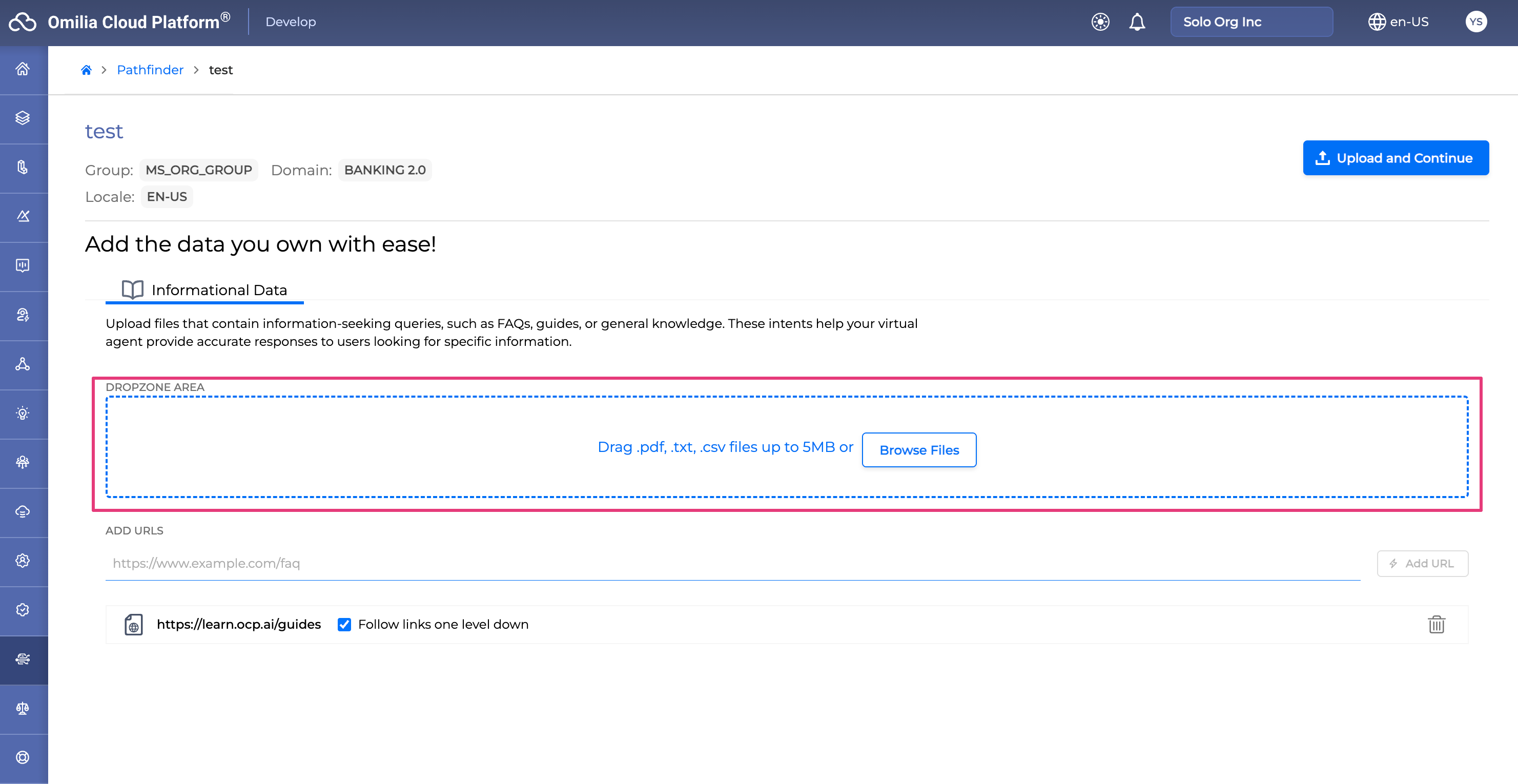
You can also provide your data from a URL. To do it, paste the URL in the field below and click +Add URL. After clicking the + Add URL button, you can optionally toggle on Follow links one level down if needed.
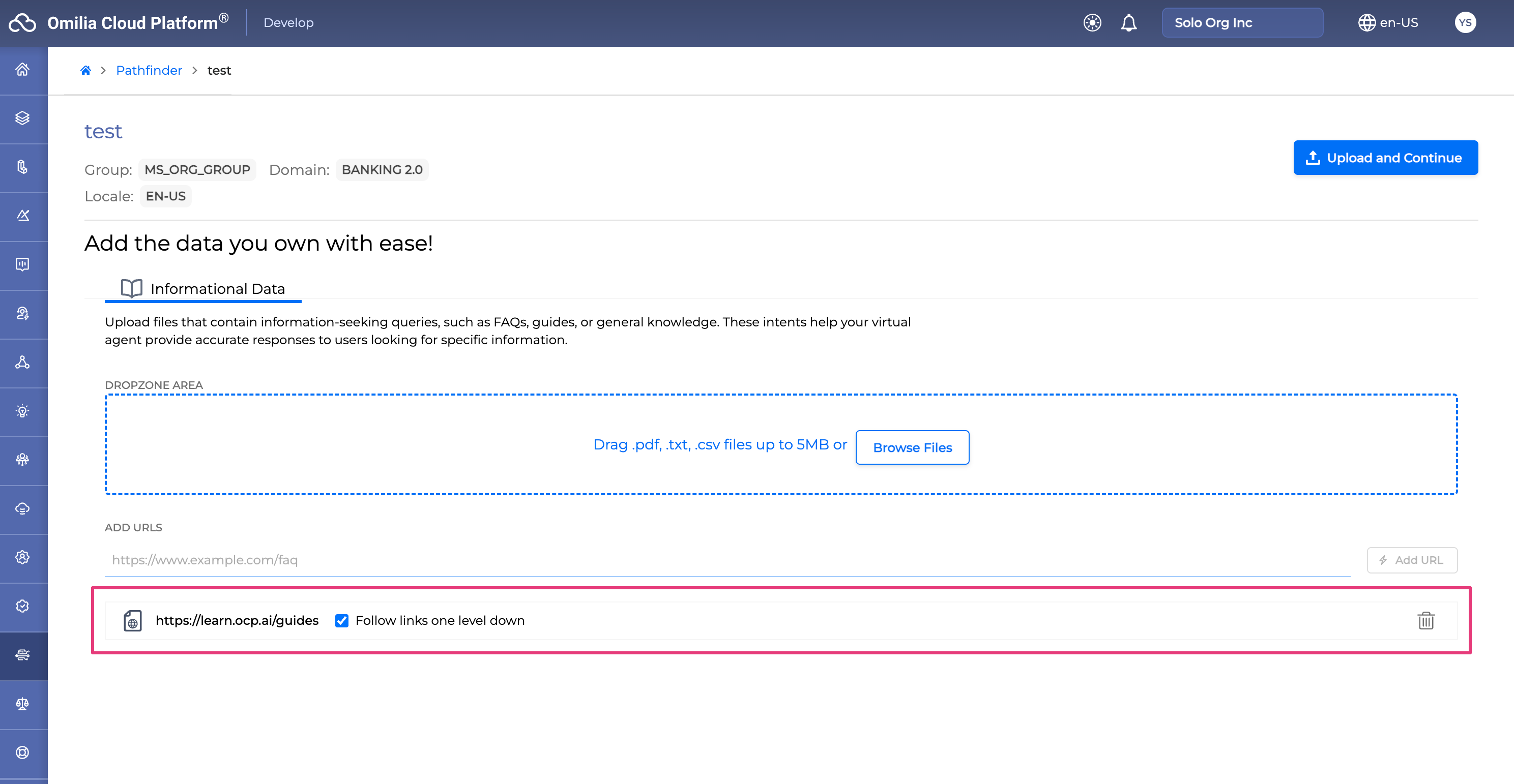
You can delete any previously added file or URL by clicking the Trash icon to the right of it.
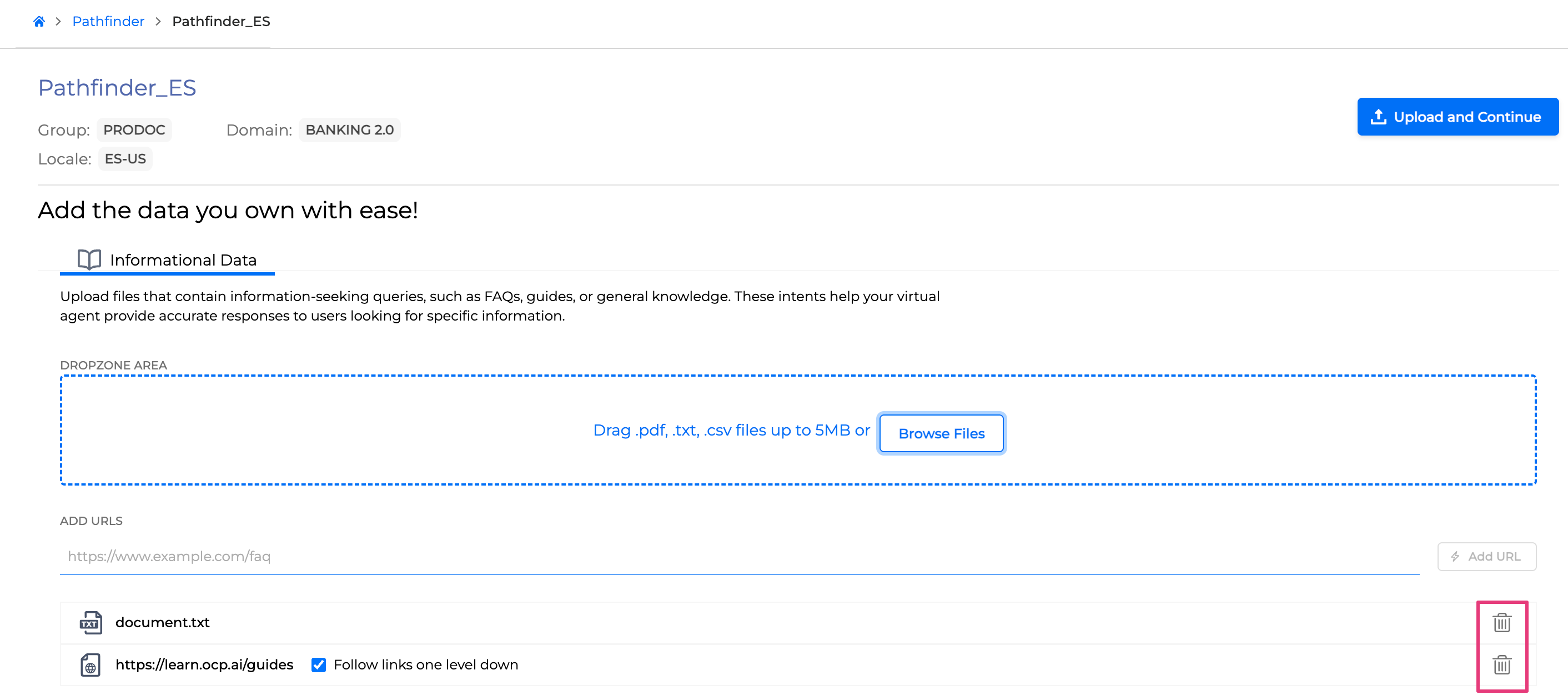
Once you’re finished, click the Upload and Continue button in the upper right corner of the screen.
When the data is uploaded, a pop-up message saying "Resources added successfully!" will appear in the upper right corner of your screen.

You will then be redirected to the detailed view of your project.
After a successful upload, it may take several minutes for Pathfinder to analyze the data and generate a list of intents.
Retrieval-Augmented Generation
When creating a new Pathfinder project, Based on the application of your prospective project, you can choose between the generation of the FAQ that will be augmented in real time by LLM (the Generative AI option) or the FAQ with the Pre-defined answers to utterances (called Sample Inquiries) within your intents. The Pre-defined option uses less resources for deployment, and allows for the offline application of the FAQ.
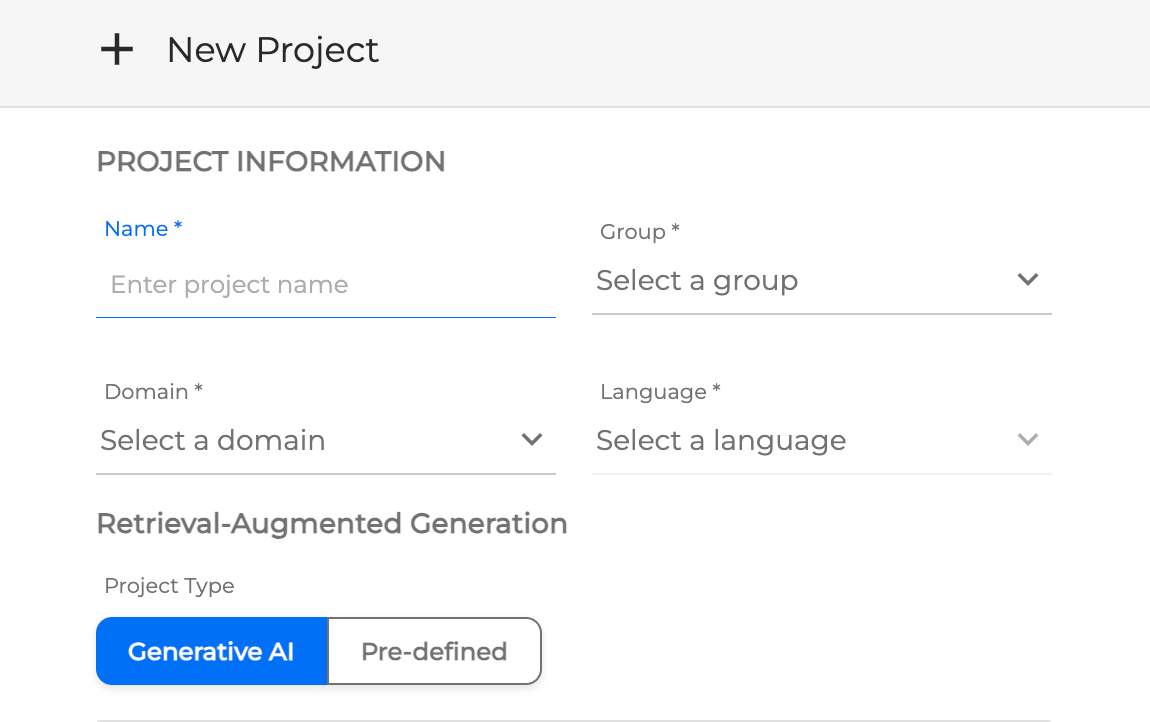
Generating Responses
After your Intents were generated based on the data you uploaded, you can generate responses for all Intents or for a particular utterance within an Intent, either by clicking Generate Responses in the top right corner of the screen, or click the Generate response button underneath each utterance, respectively.
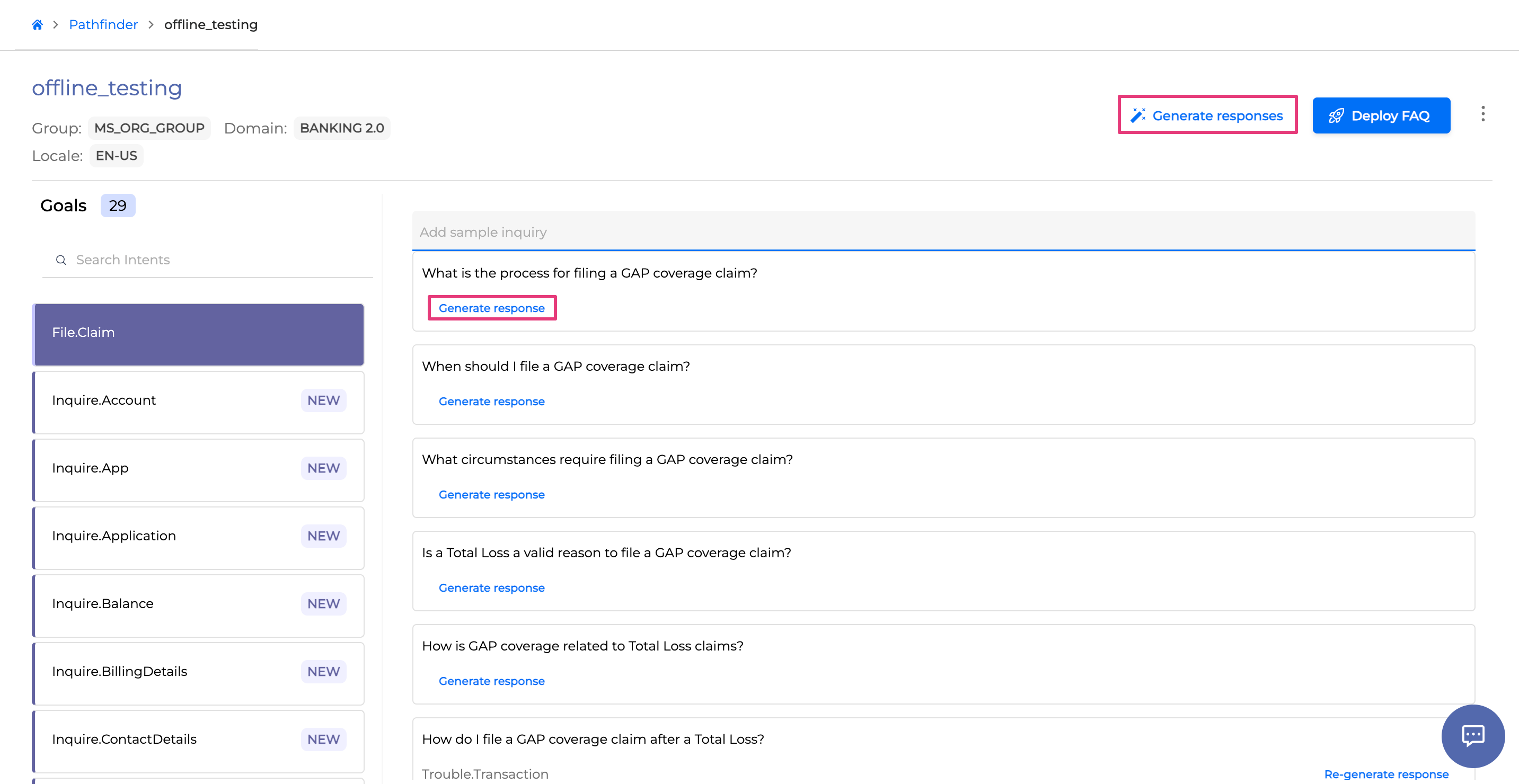
You can re-generate the response for a particular utterance, however you can only delete an utterance together with its response (which are considered a single entity in a Pre-defined type of project).

Project View
Within the detailed view of the project, the intents are displayed in the Goals list on the left. You can use the Search Intents field to look up specific Intents added.
You can also manually add intents by accessing the options menu to the right of the Deploy FAQ button and selecting + Add Intent.
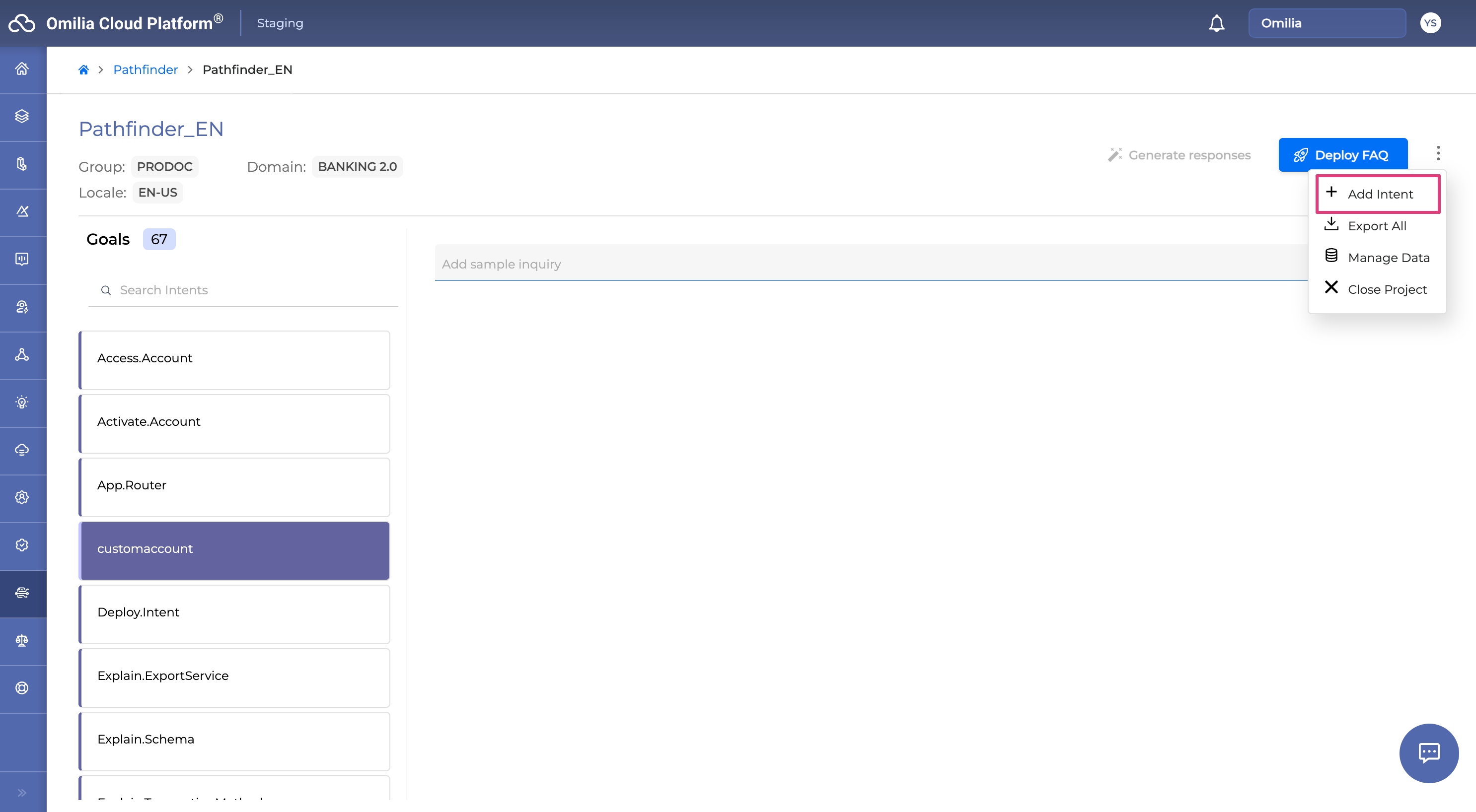
Manage Data
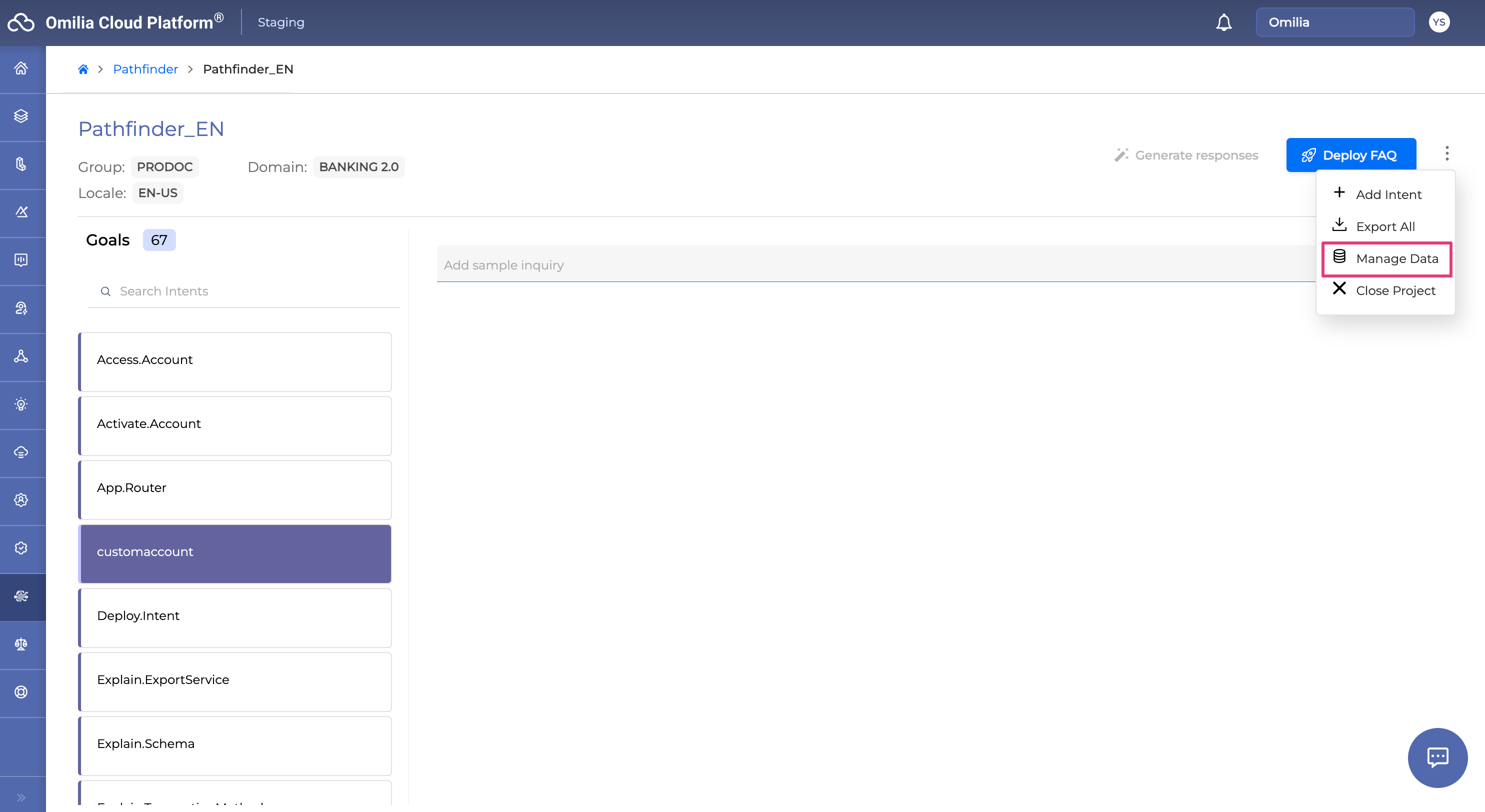
Go to the options menu to the right of the Deploy FAQ button and select Manage Data to access two tabs :
-
Files: Displays the files/URLs you've uploaded and their status.
-
Upload: Allows you to upload more data to the current project from all possible categories.
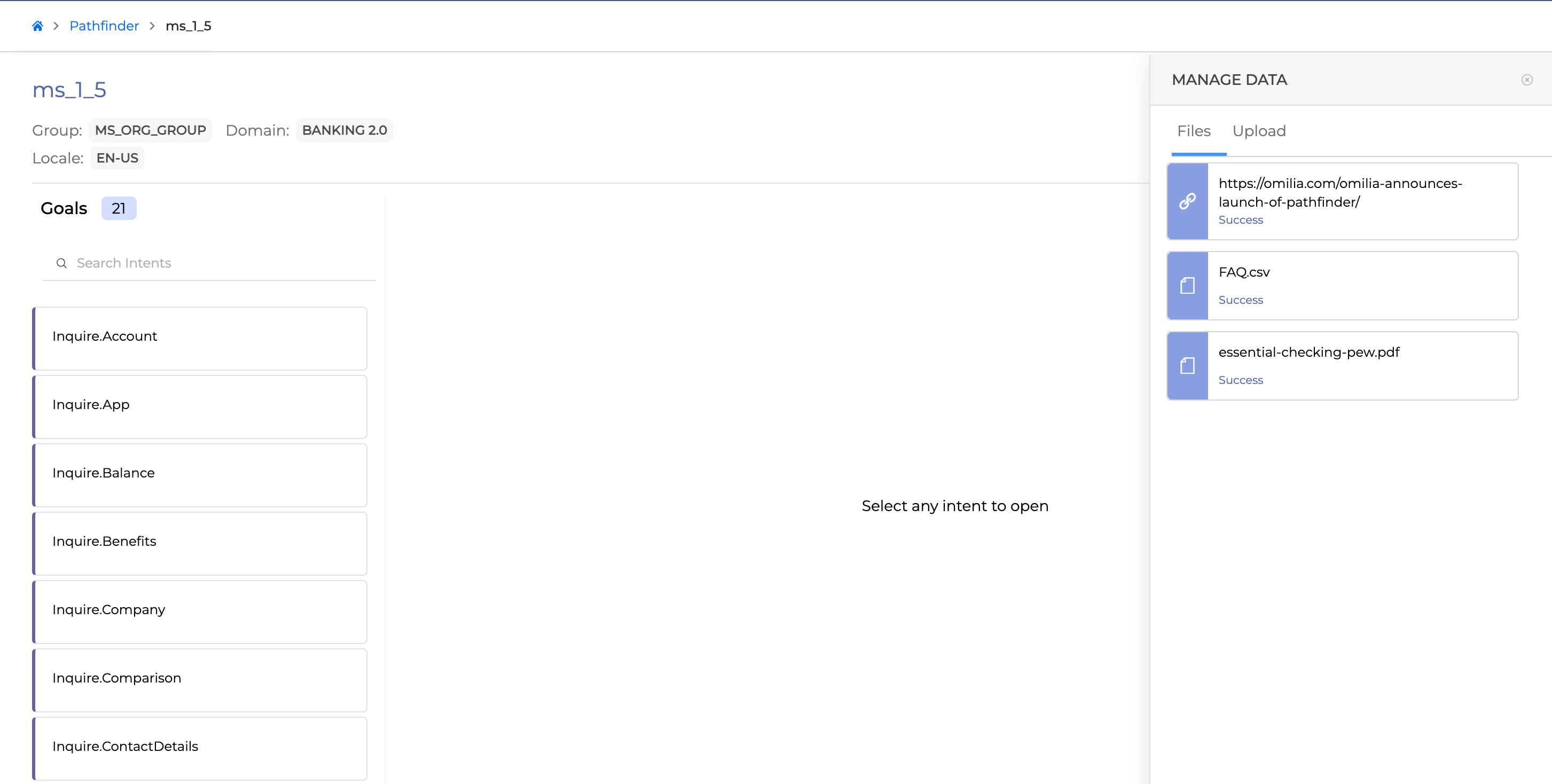
The Upload tab contains the same data uploading options as were available when creating the project:
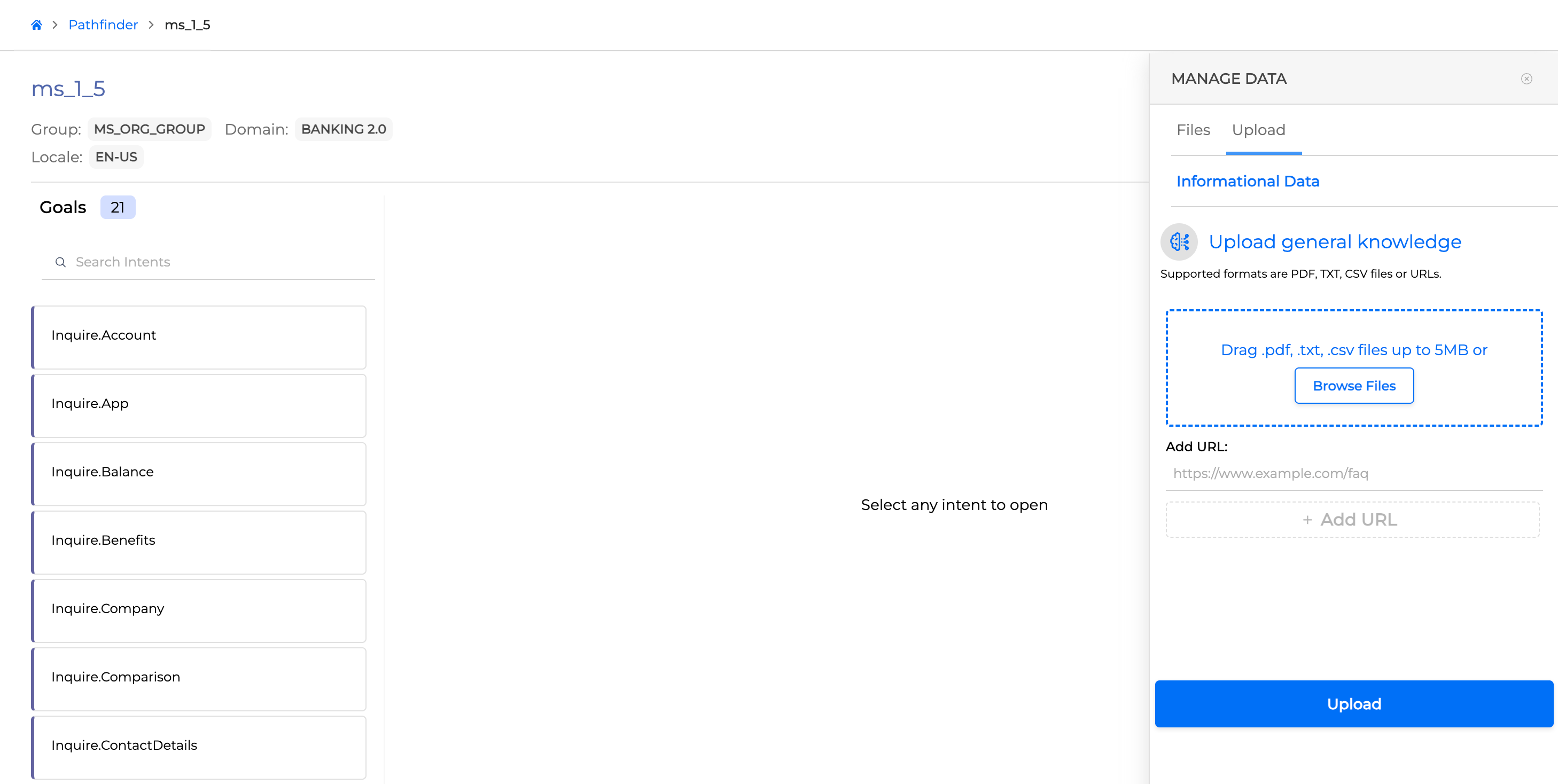
The intents created by the upload, will appear at the top of the intents' list marked as New:
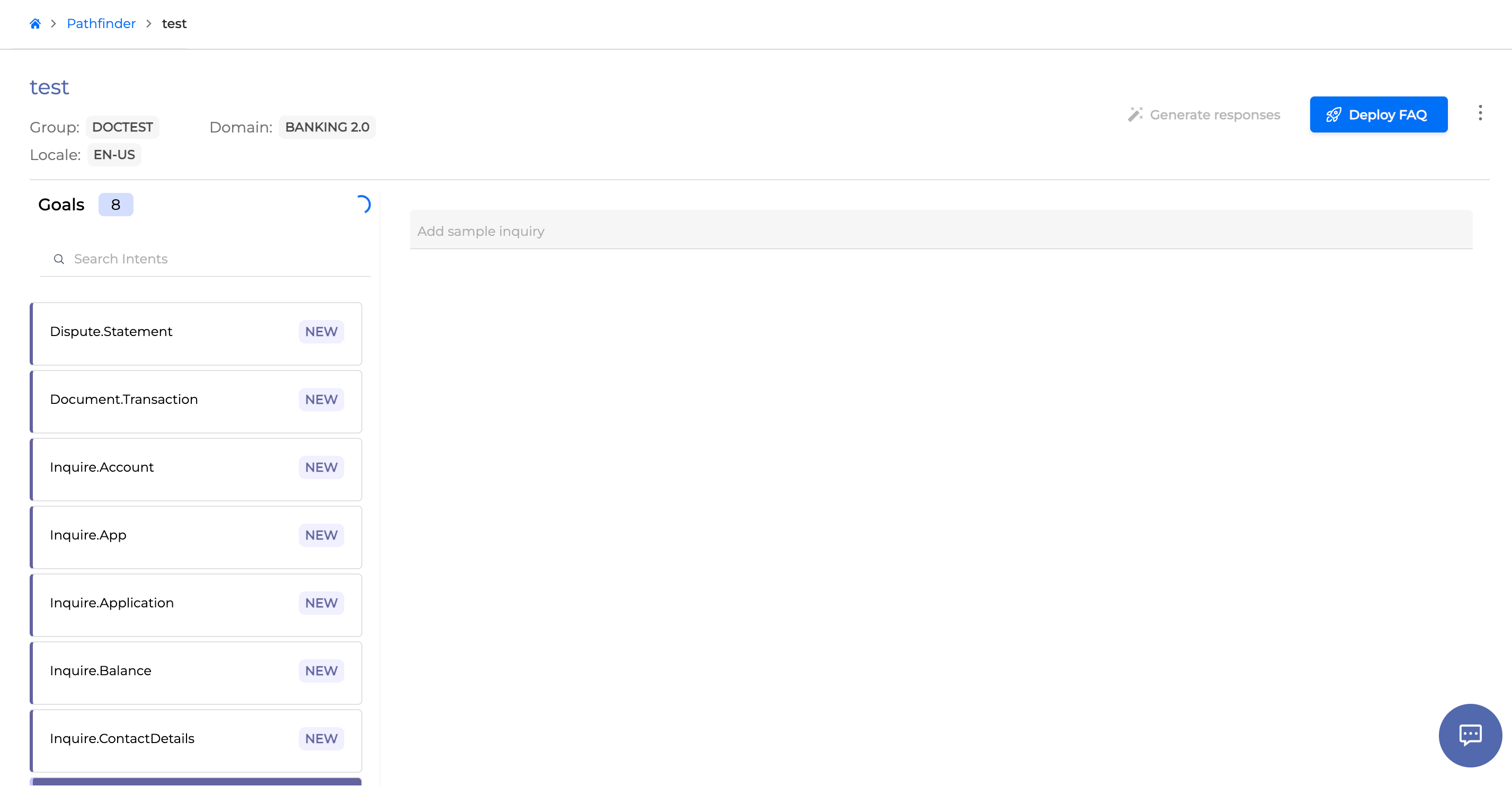
Work with Intents
The intents are displayed in the Goals list on the left. You can use the Search Intents field to look up specific Intents added. To view details of a specific Intent (whether generated from the data you uploaded or created manually through the Pathfinder interface) along with its Sample Inquiries, click the Goal name.
.png?cb=1372881755985b4c5ace229eaf57ea6c)
Create Custom Intent
To manually create an Intent for a project, click the Options menu and select + Add Intent.

Write the name of the Intent and press the Create button.
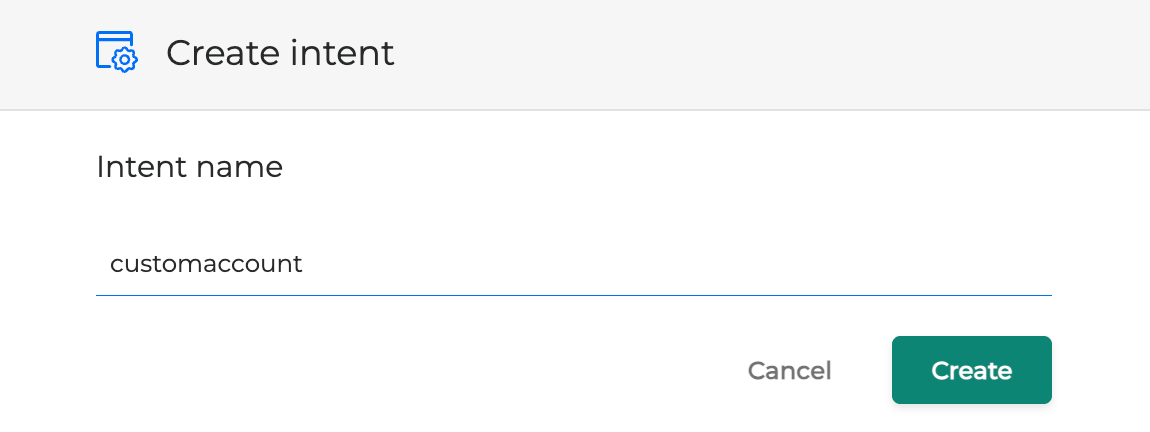
The Intents created manually will be labeled as Custom for convenience:
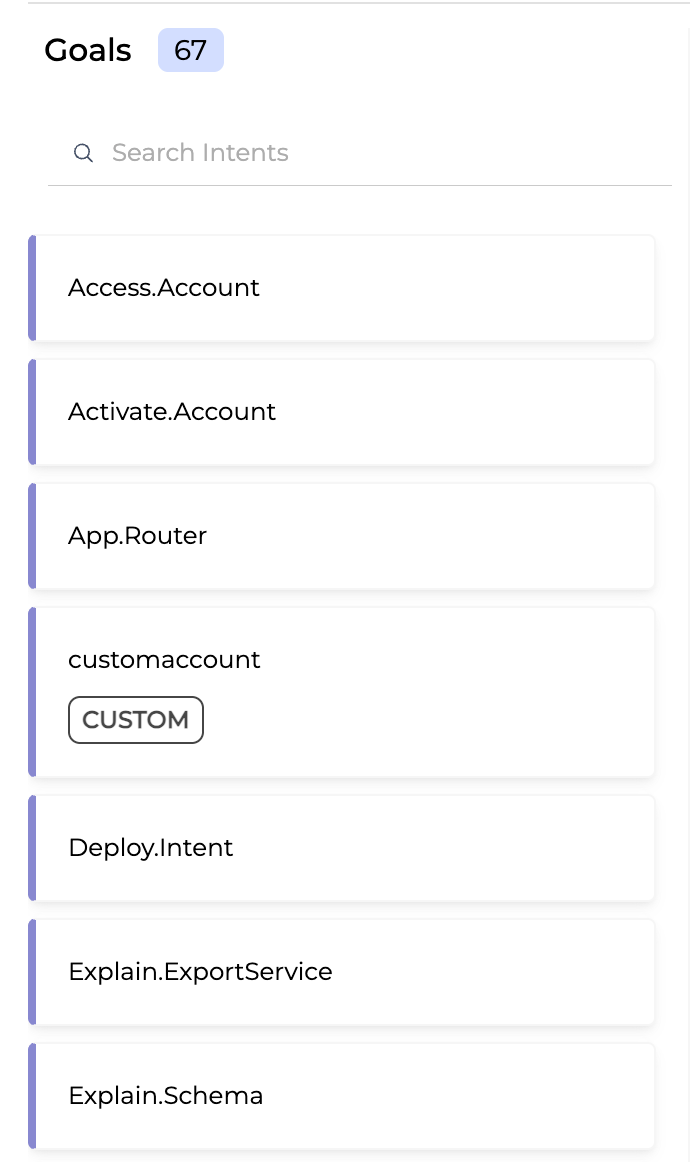
Goal's Sample Inquiry
It’s possible to add, edit, and delete Sample Inquiries both for Intents generated based on the data you uploaded or created manually.
After Intents were created, you can still add more utterances to them if needed. To do so, click the preferred Intent and type in your utterance in the Add Sample Inquiry field. Press Enter to add the utterance to the Intent.
.png?cb=387754c1b4cb458135f559cf3201335c)
To edit a specific Sample Inquiry, double-click on it to activate the editing mode. Press Enter when finished to save changes. You can also delete a Sample Inquiry by hovering over the utterance in question and clicking the Trash icon to the right of it (appears on hover).
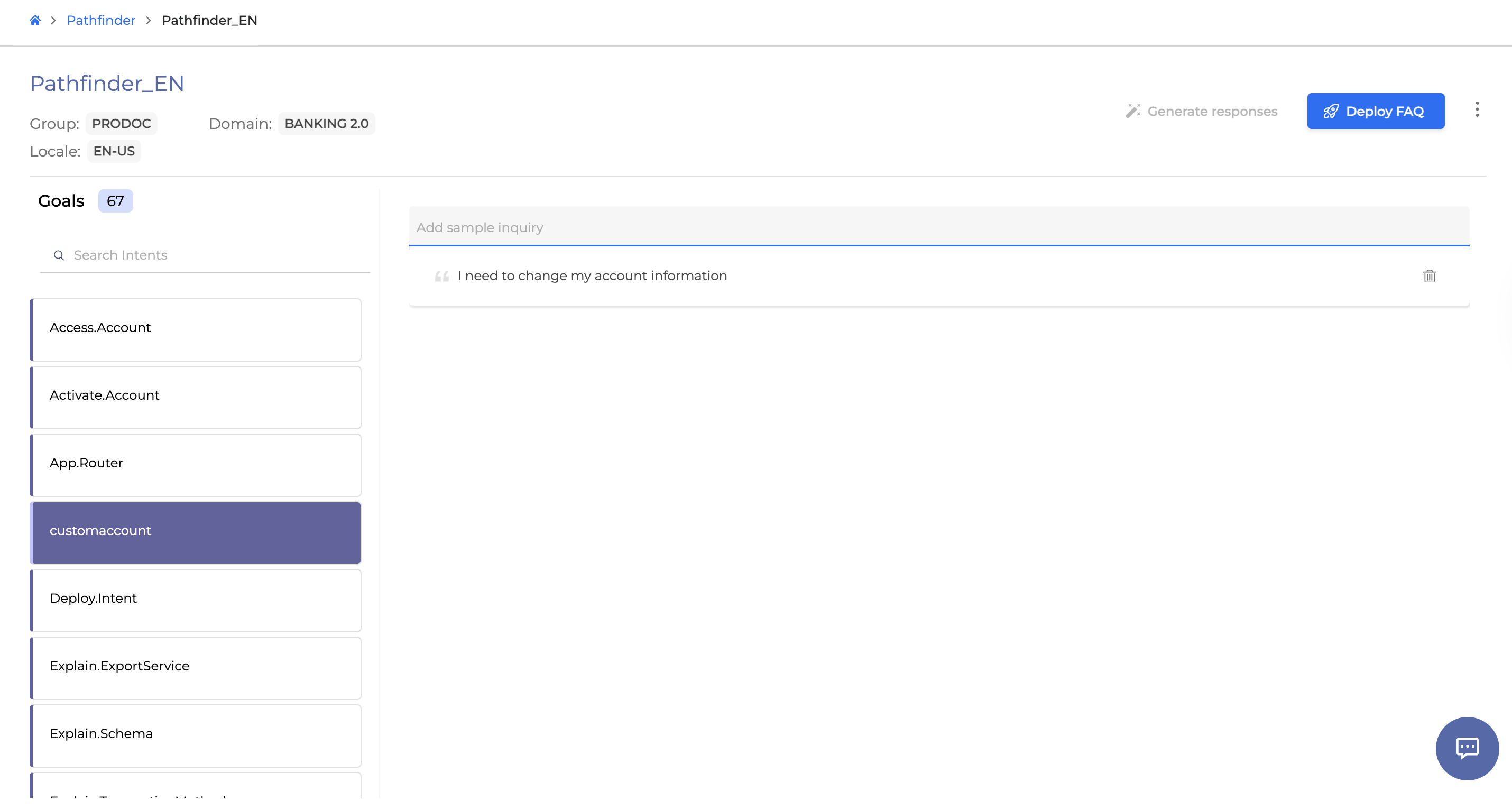
You can add, edit, and delete utterances for a specific Goal, but you can’t edit or delete the Intent itself once added.
Deploy FAQ
Once you create all Intents and edit them as needed, and your FAQ is ready to go, click the Deploy FAQ button to publish the current state of your Pathfinder project.
Once you click the Deploy FAQ button, you can do further changes to your Intents and add any additional data safely without worrying about changes automatically going live. For example, edit Intents or create new ones without these new items appearing right away in the project version you currently have in use.
When you’re done adding changes, click the Deploy FAQ button again to publish these changes and use the newest version of your Pathfinder project.
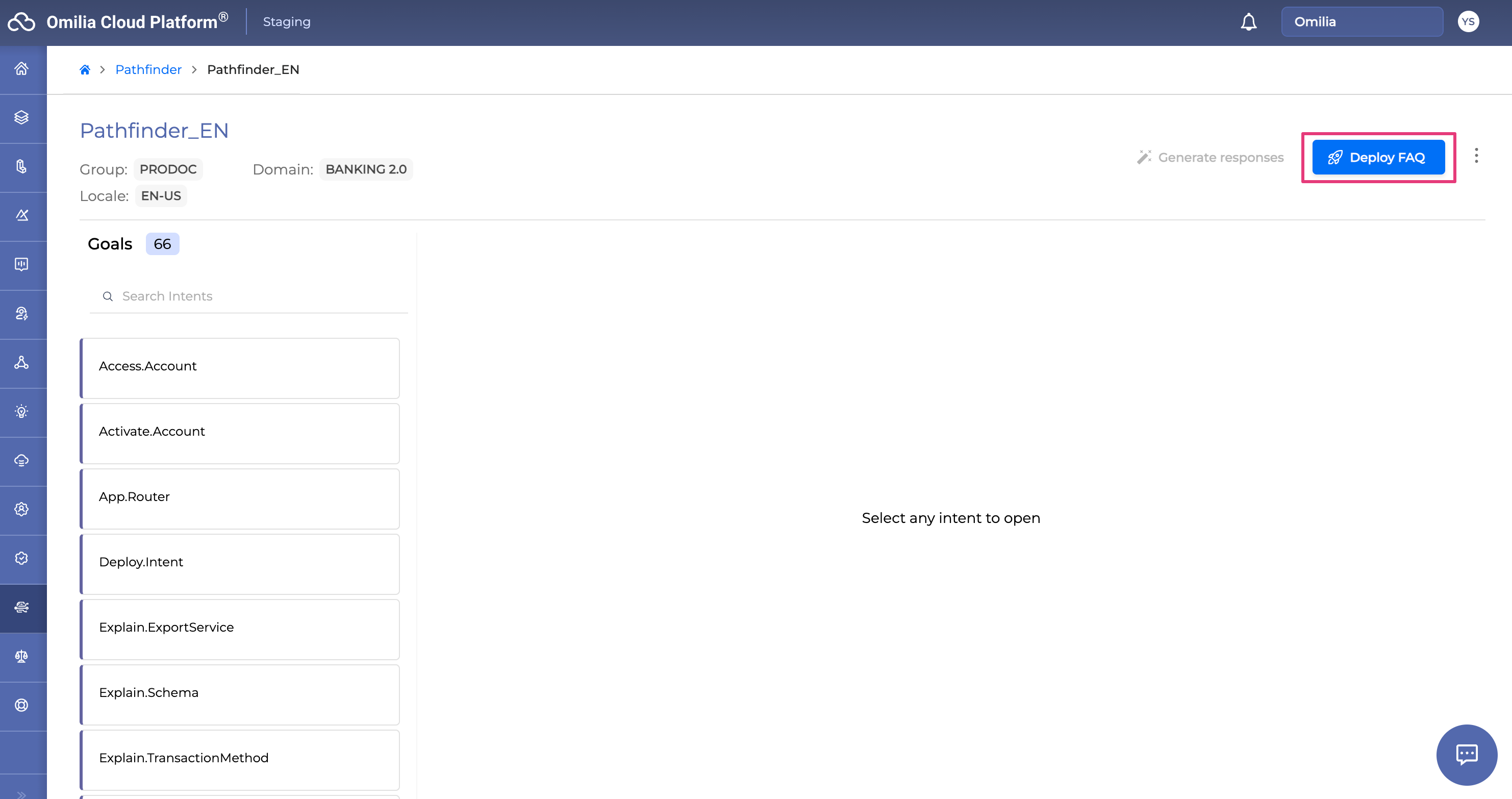
After deployment, your project will appear in the list of Pathfinder projects when selecting a knowledge base during the creation of an announcement. For more information, see Intent OCP miniApps.
Chat Simulator
To test your Intents and Sample Inquiries, you can use a Chat Simulator feature available in the bottom right corner of your detailed project view. Click the violet chat icon as shown on the screenshot below to expand the Chat Simulator.
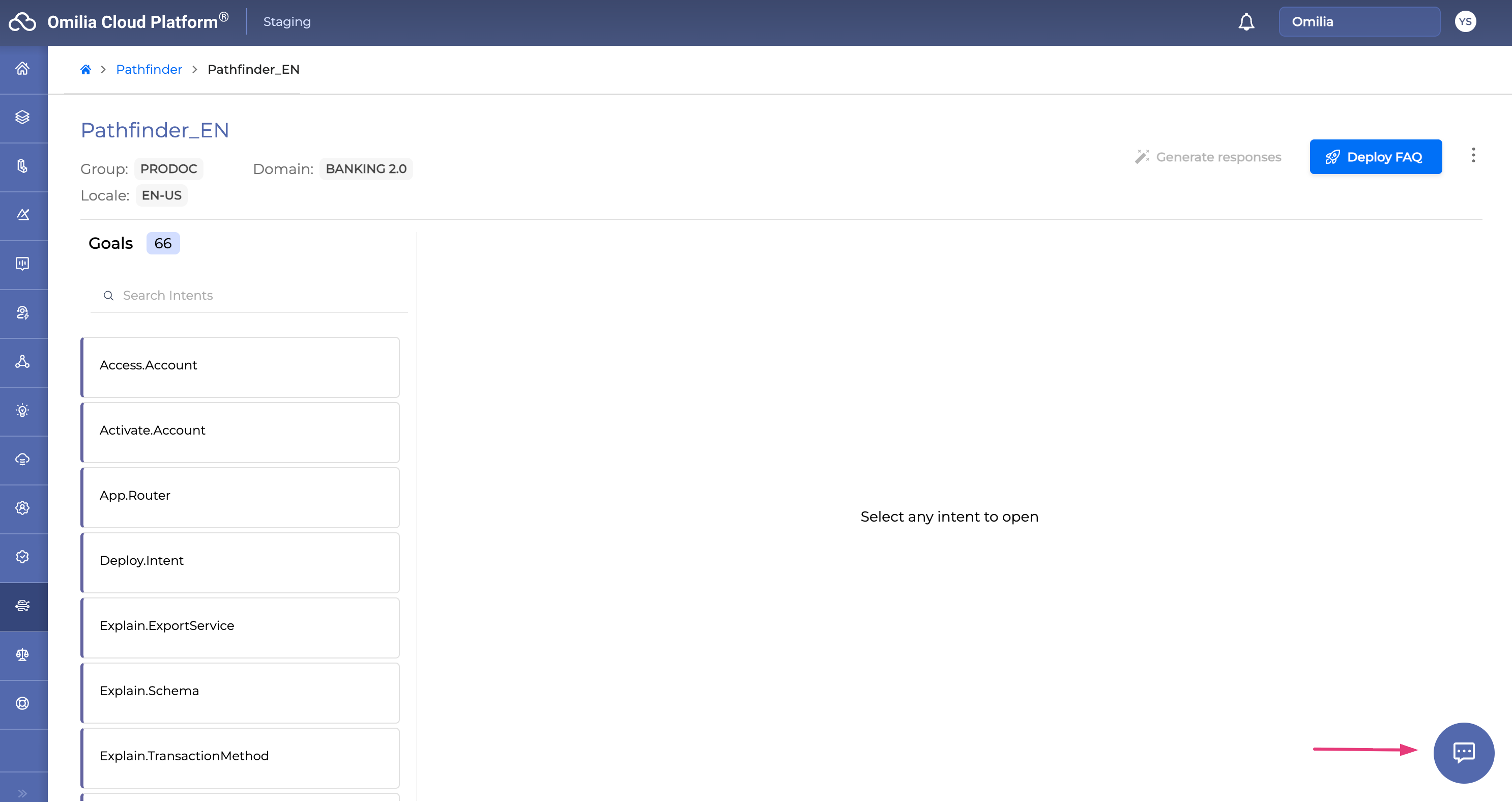
You can copy one of the existing Sample Inquiries and paste the text in the Chat Simulator. To send your message, either click the Send icon or press Enter. You can then add a follow-up question to continue the session. To restart the conversation, click the Restart icon.
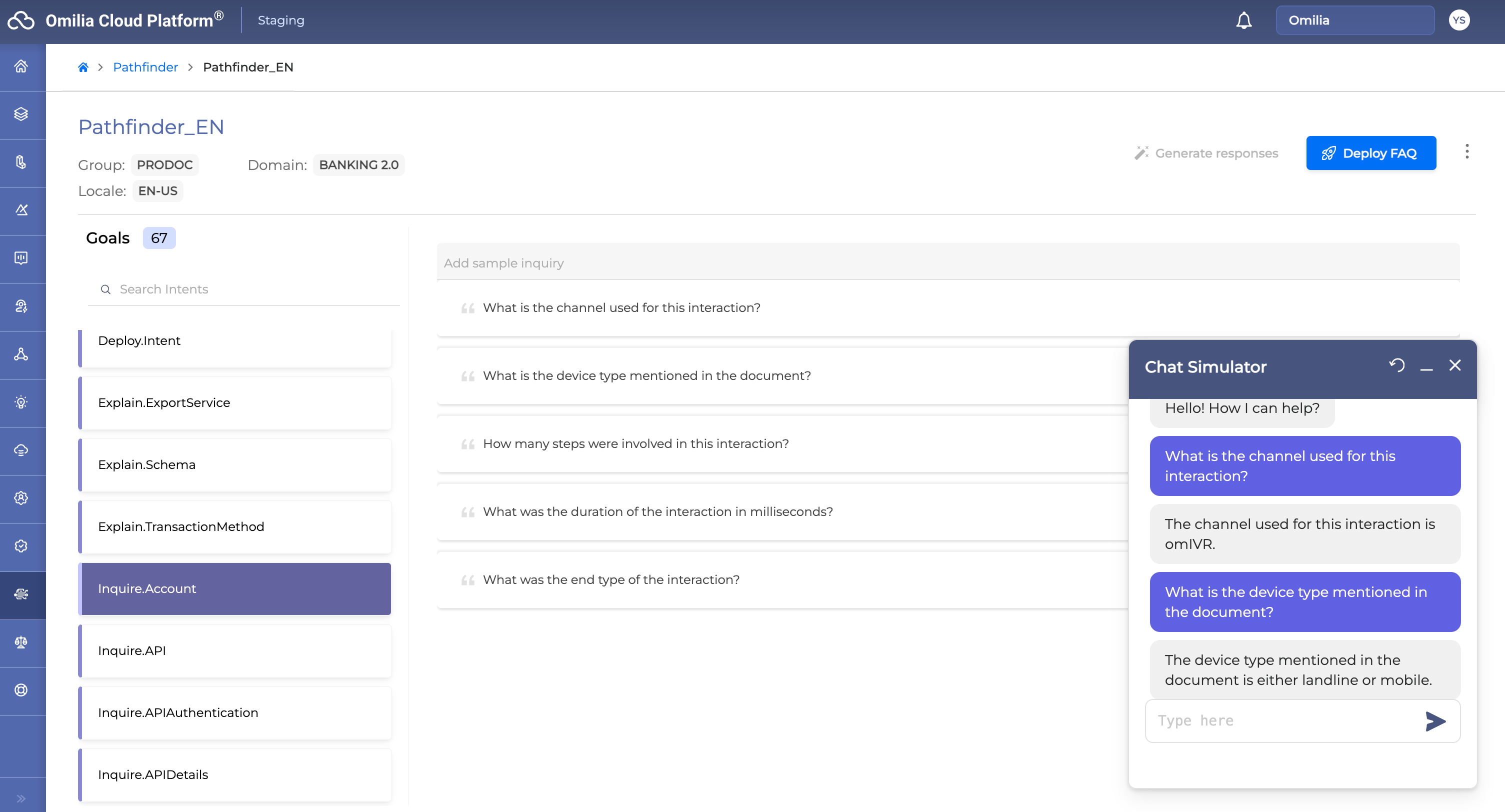
To collapse the Chat Simulator window, click the _ icon. To close the Chat Simulator, click the X icon. Collapsing the tool will not delete the current test conversation, and you can view it again after clicking the Chat Simulator icon. Closing the Chat Simulator window will erase the current test conversation and bring you to the starting point when you open the chat next time.
Export Project Data
You can export all the intents and their utterances to a CSV file. This allows you to examine, share, and analyze the conversational data outside Pathfinder and add this data to a custom NLU model.
To export this data, click the Options menu and select Export All. Once the export is processed, a CSV file will be generated and made available for download. Save the file to your desired location on your computer.
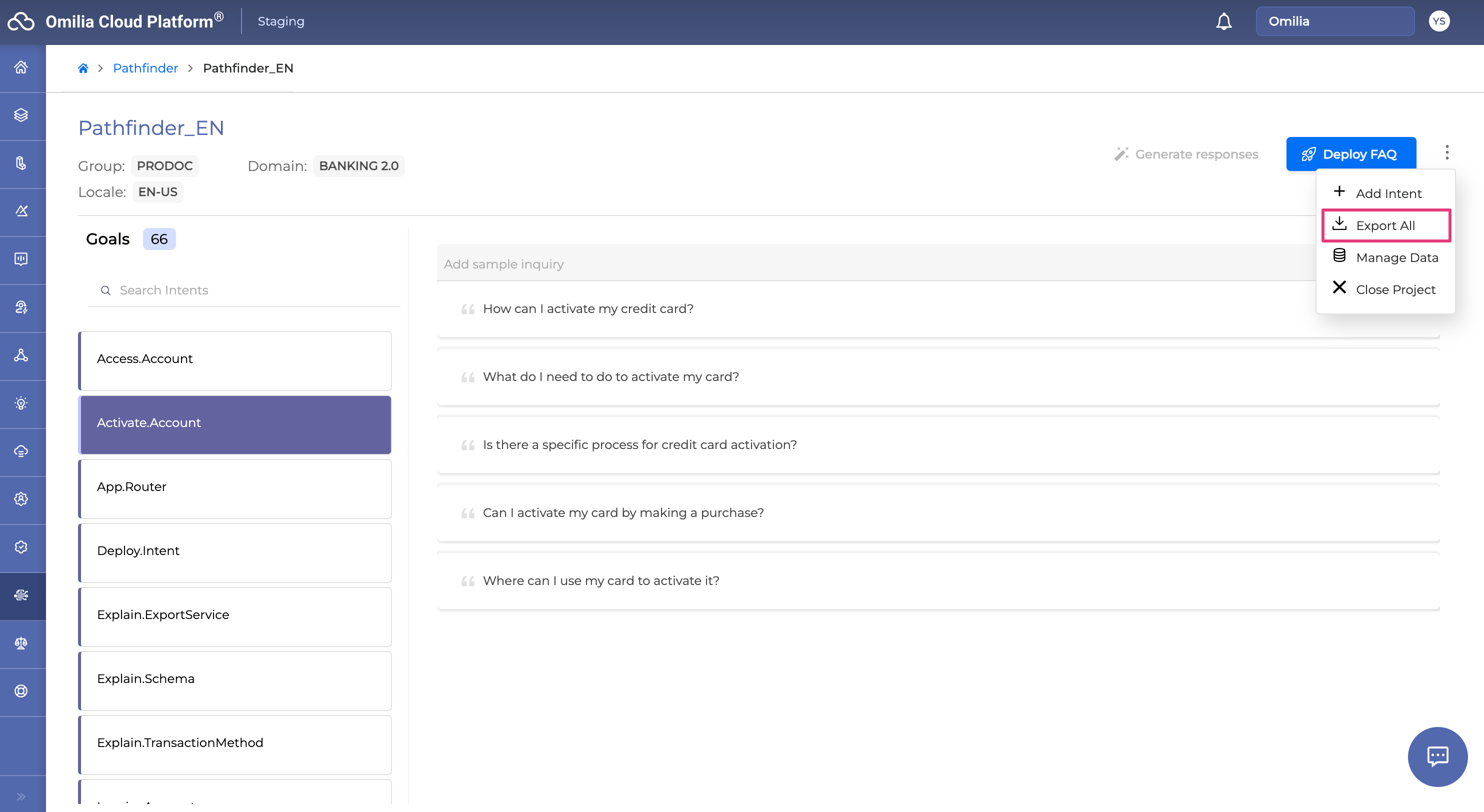
Manage Projects
You can view all your created projects in the Pathfinder tab. To rename or delete a project, click the Options menu to the right of the specific project and select Rename or Delete.
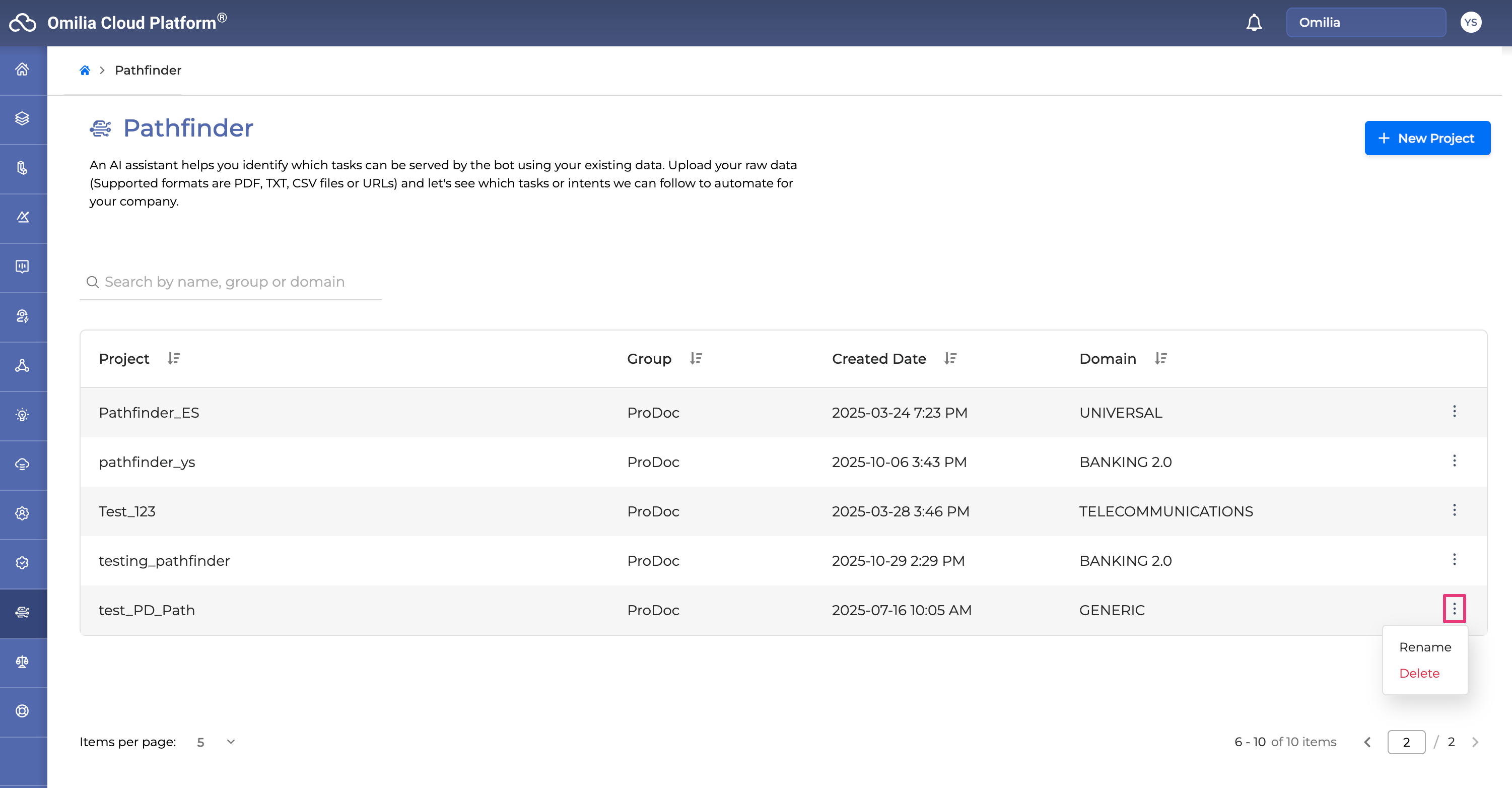
Deleting a project doesn't remove it from Pathfinder entirely; it archives the project instead. As a result, if you delete a project, you won’t be able to create a new project with the same name.
If you attempt to do so, you’ll see the following error: “Found an archived project with the same name and group. The combination of project name and group should be unique.”
It’s also not possible to rename an existing project to match the name of the project that was previously deleted.
In such cases, you’ll get the following error: “Found an existing project with the same name and group. The combination of project name and group should be unique”.